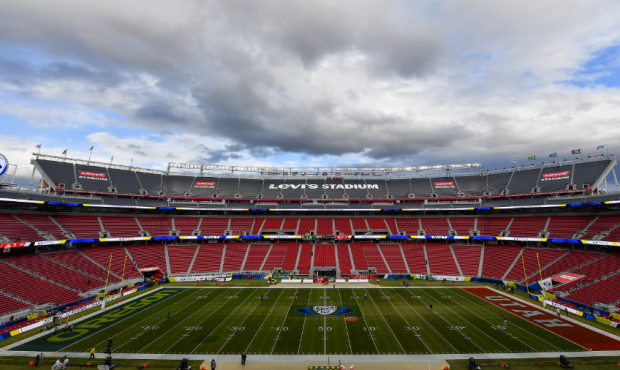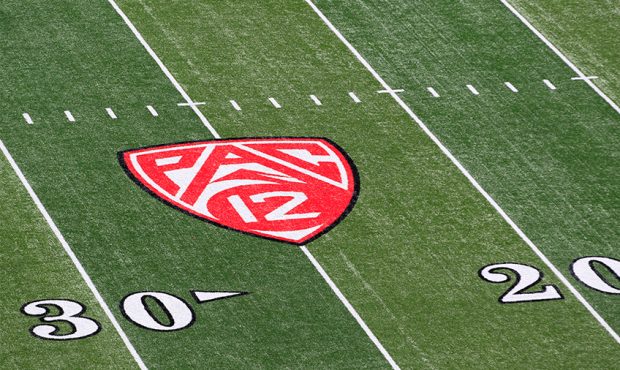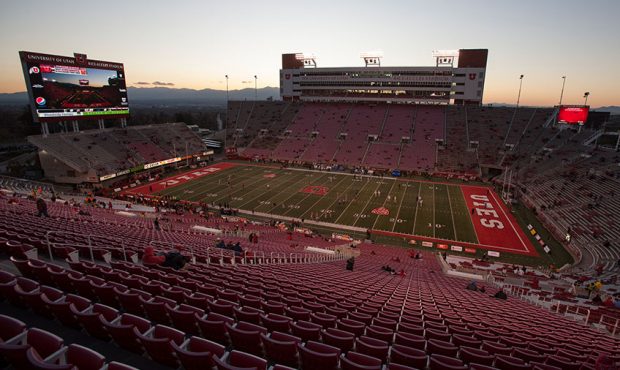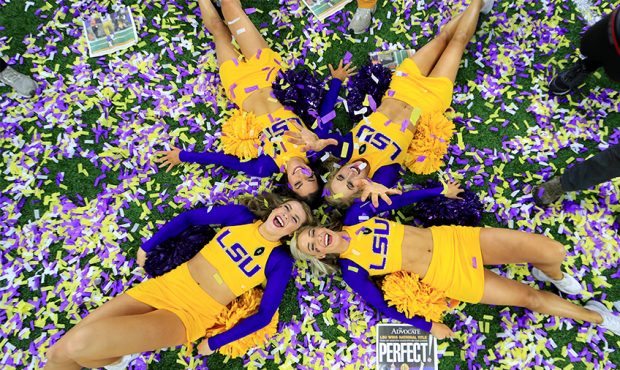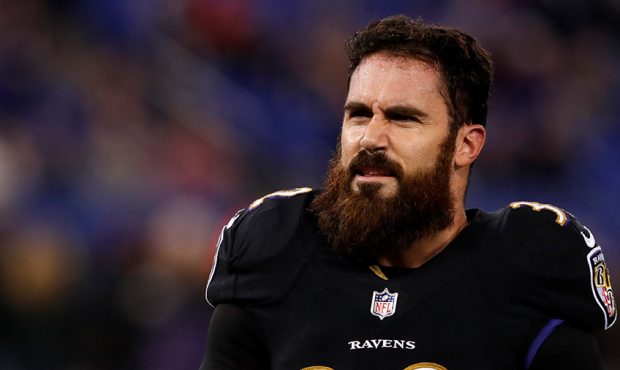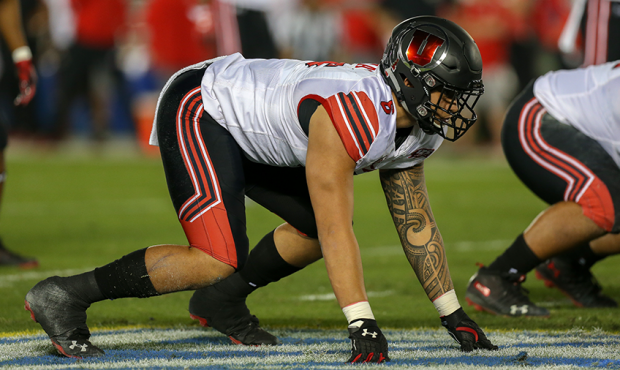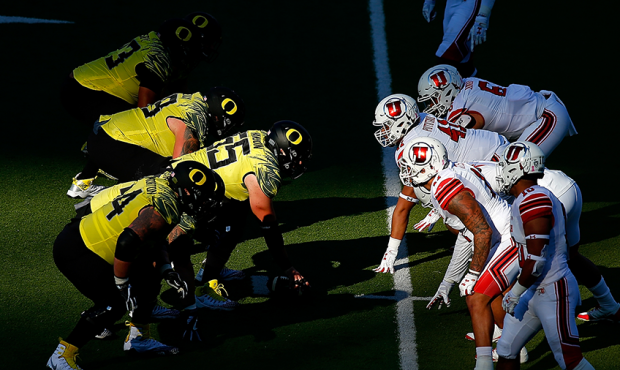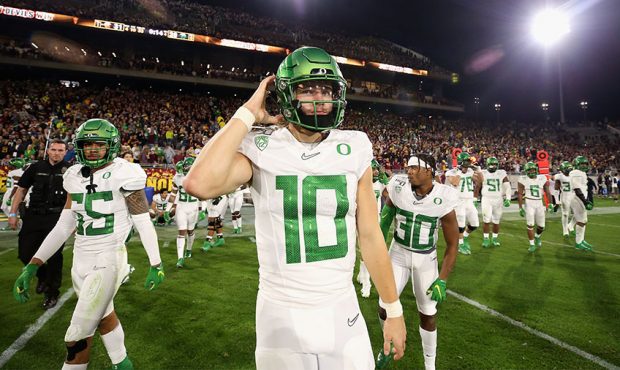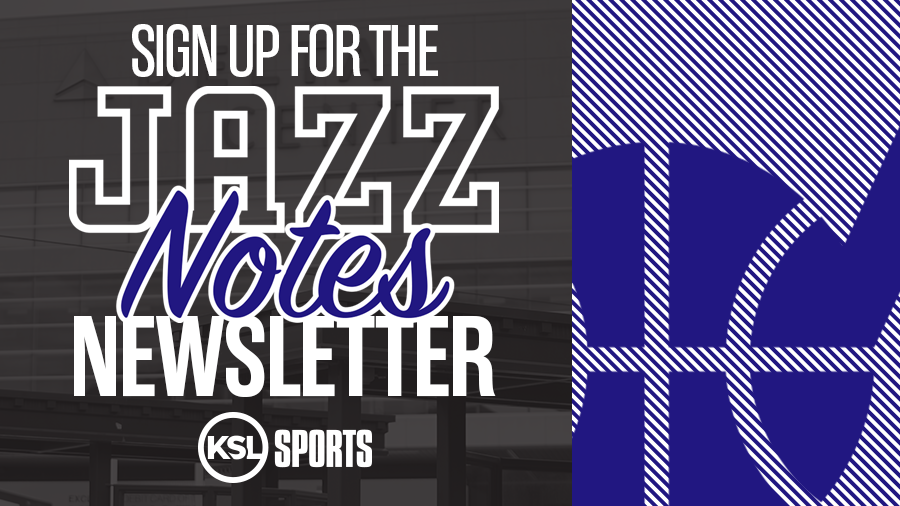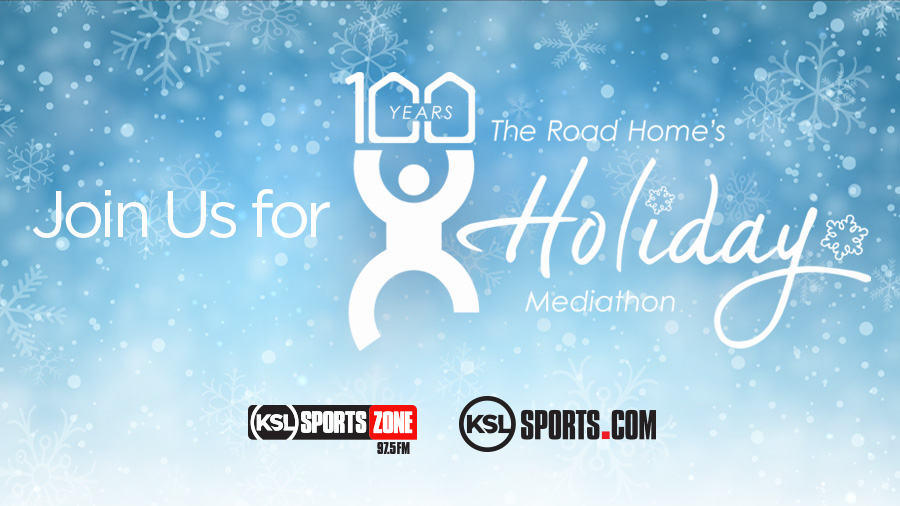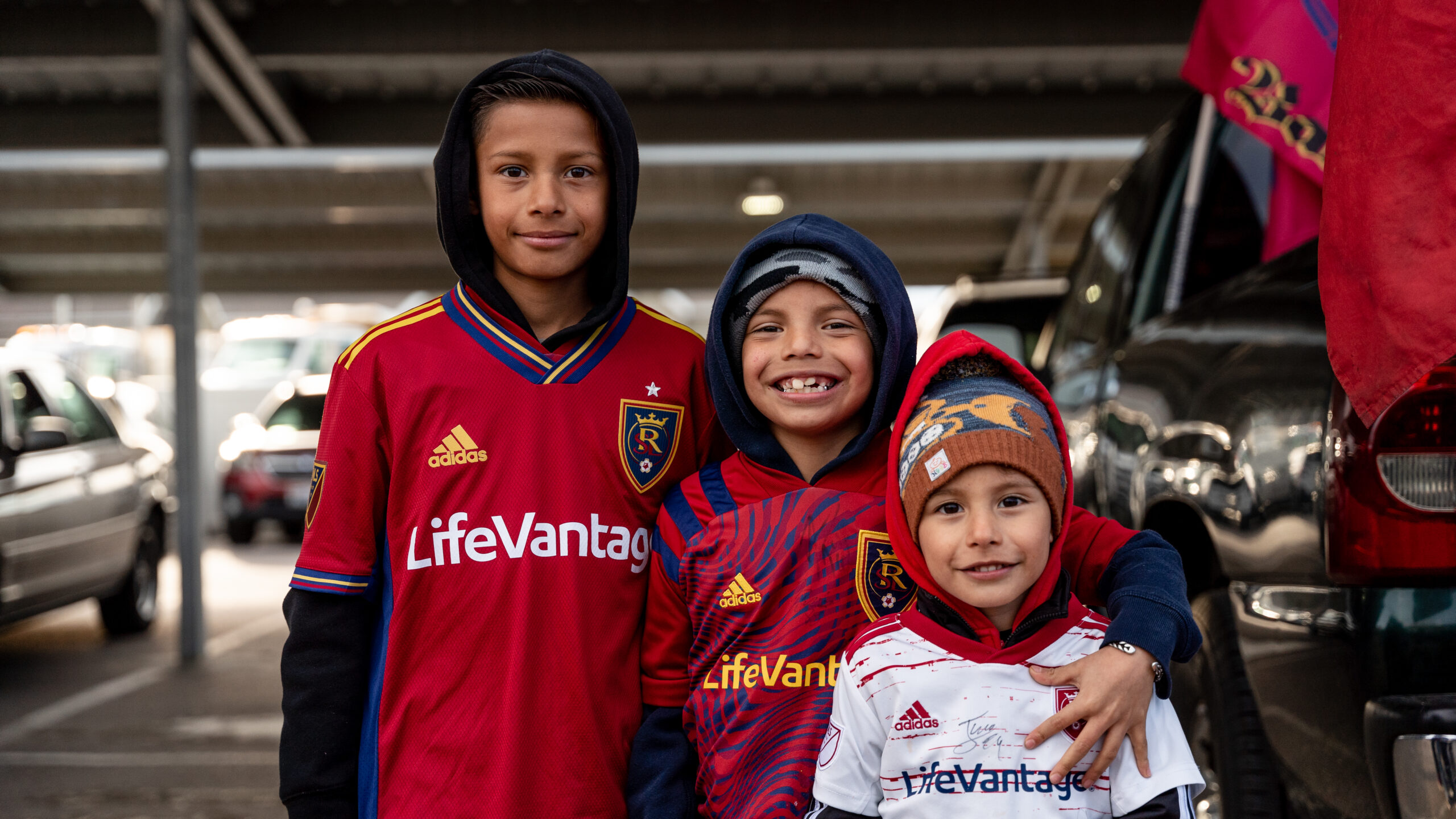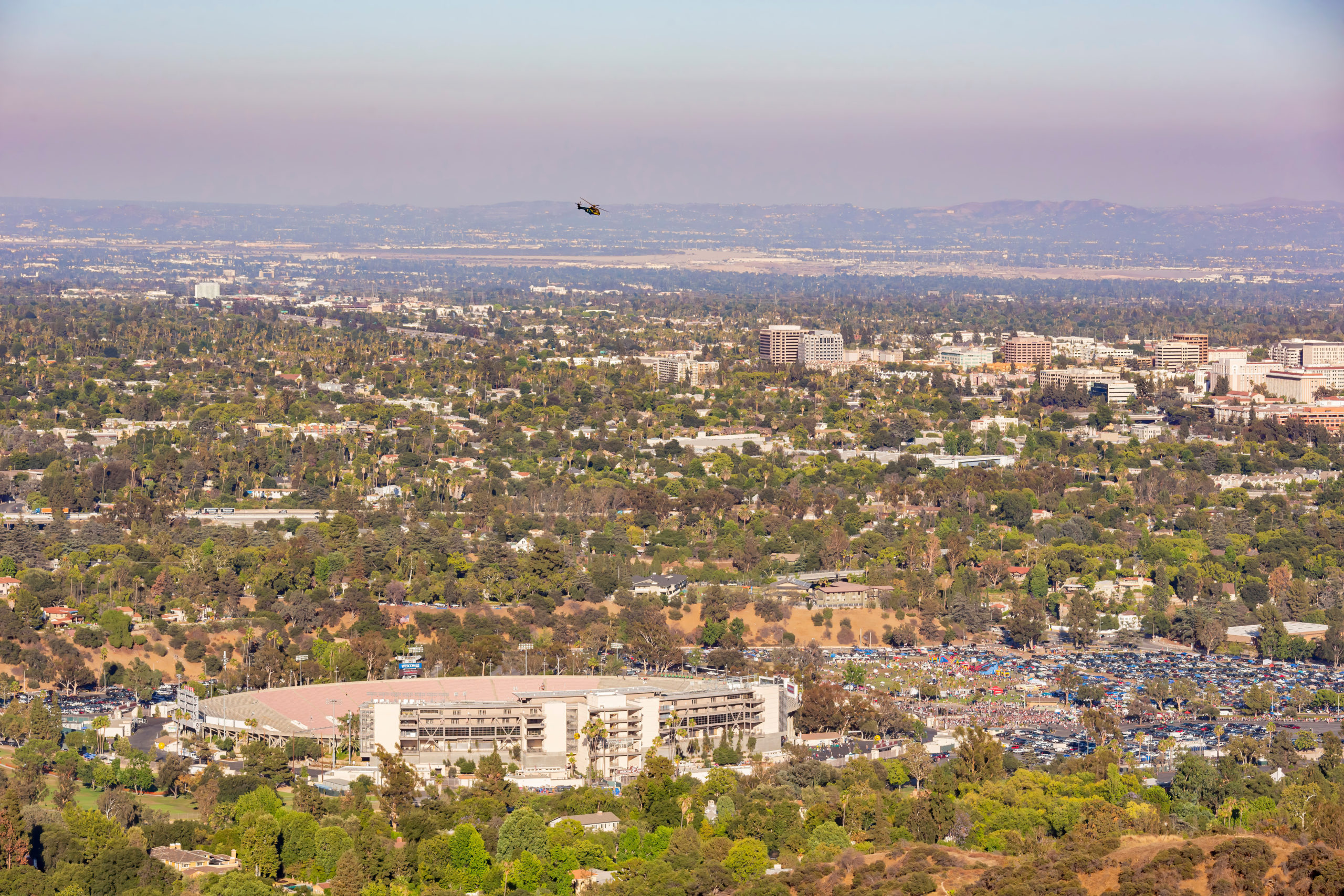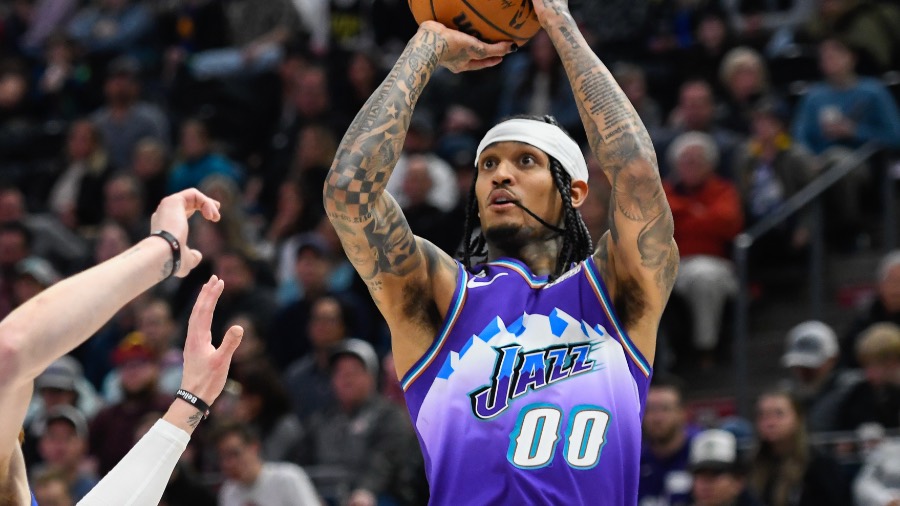O’Connell: Dissecting Pac-12 Student-Athlete Demands
Aug 2, 2020, 1:10 PM | Updated: 4:50 pm
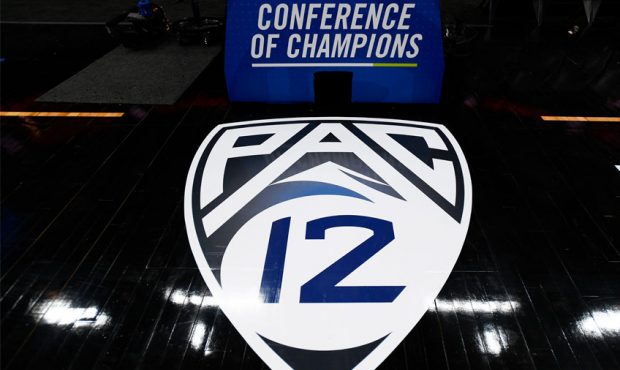
The Pac-12 logo on the court the first round game of the men's Pac-12 Tournament between the Oregon State Beavers and the Utah Utes on March 11, 2020, at the T-Mobile Arena in Las Vegas, NV. (Photo by Brian Rothmuller/Icon Sportswire via Getty Images)
(Photo by Brian Rothmuller/Icon Sportswire via Getty Images)
SALT LAKE CITY, Utah – Pac-12 athletes are essentially on strike. Players published a #WeAreUnited statement and list of demands through The Player’s Tribune, stating that they would not participate in mandatory camp practices or games until the demands are met.
The revolution of college athletes has begun on our home turf, in the Pac-12 Conference. Let’s go through the #WeAreUnited statement of Pac-12 players’ demands line-by-line. Let’s also keep in mind that it is virtually impossible for the Pac-12 to concede on all of these points. So far, we don’t know which demands are most important to the players. It will be important to figure that out as the discussion progresses in coming weeks.
The Players of the Pac-12 will opt-out of fall camp and game participation due to COVID-19 and other serious concerns unless the conference guarantees in writing to protect and benefit both scholarship athletes and walk-ons. #WeAreUnited https://t.co/KQ3oqdB5BL
— The Players' Tribune (@PlayersTribune) August 2, 2020
“Because NCAA sports exploit college athletes physically, economically and academically, and also disproportionately harm Black college athletes, #WeAreUnited.”
First of all, if your sport is not generating revenues in the net-positive for your school or athletic department, I’m not sure how legitimately one can claim that they are being “exploited.” Let’s assume this document is meant to address the problems in college football and basketball, because with rare exception, those are the sports that create the inflow of funds that are being quarreled over. We will move forward under the assumption that his applies to football and basketball.
Second, (and probably more important in the current socio-political climate) the statement that college athletics disproportionately harm black athletes needs to be addressed. If this is true, then the wording also ignores the fact that college athletics also disproportionately benefits athletes of color.
#WeAreUnited pic.twitter.com/nUdIhlHAig
— Penei Sewell 🇦🇸 (@peneisewell58) August 2, 2020
It is no secret that football and basketball depend on rosters filled with a majority of Black players. This means that the majority of scholarships go to Black student-athletes. Even the staunchest supporter cannot claim that college sports do no harm at all to their participants, but it has also long been true that athletic scholarships have long served as a vehicle for upward mobility for students who otherwise would not have access to a college education.
This is an unfortunate reality, but it is a reality applies to many of the more vulnerable communities that produce college players, often players of color. Whether the overall outcomes in the current system are net-positive or net-negative, those outcomes are disproportionately applied to young people of African-American heritage. The good and the bad.
“In rejecting the NCAA’s claim that #BlackLivesMatter while also systematically exploiting Black athletes nationwide, #WeAreUnited.”
Simply saying #BlackLivesMatter is not enough. We can all agree on that. This sentence applies to the nuanced debate mentioned above. If a free education in exchange for sports participation qualifies as exploitation, we need to be clear in defining that term, and find a system that allows Black players to feel valued, rather than used.
“Because we are being asked to play college sports in a pandemic in a system without enforced health and safety standards, and without transparency about COVID cases on our teams, the risks to ourselves, our families, and our communities, #WeAreUnited.”
The Pac-12 Conference has adjusted their schedule to conference-only for the express purpose of being able to control these standards. Improved transparency would be the best for everyone involved and allow players to make informed decisions on whether or not to participate.
“Because we must have adequate COVID testing to help protect our health, #WeAreUnited.”
Very reasonable. Everyone returning to work would love to have adequate testing. College and pro athletes seem to be the only ones likely to have this provided by their companies/departments.
KSL Sports Front Page: Special Edition
KSL Sports' Utes Insider Trevor Allen and Columnist, Sirius XM Pac-12 host Sean O'Connell talk about the movement and change that Pac-12 student-athletes are going for with a list of demands.
Posted by KSL Sports on Sunday, August 2, 2020
“Because we are prohibited from securing representation while being asked to sign documents that may serve as liability waivers, #WeAreUnited.”
Liability waivers rarely hold up in litigation anyway, but that is not really the point here. If athletes want to keep the window open to sue their schools, college athletics disappears. Can’t have it both ways.
“Because we should not be stuck with sports-related medical expenses, including COVID-19 related expenses, #WeAreUnited.”
Absolutely true. This is what departments carry insurance for. (except BYU, those athletes have to have their own policies)
“Because any player who does not feel comfortable playing this season should be free to opt out without losing their scholarship or any eligibility, #WeAreUnited.”
My understanding is that this policy is already in place. We know that opting out will likely affect a player’s unofficial standing with his coaches and teammates, but schools will still honor at least the scholarship. Eligibility will be a MESS. Good luck handling that.
#WeAreUnited https://t.co/hu2xICjIXS pic.twitter.com/GpdX2xkCRL
— devinlloyd (@DevinLloyd_) August 2, 2020
“Because immoral rules would punish us for receiving basic necessities or compensation for the use of our names, images and likenesses, while many of us and our families are suffering economically from the COVID-19 fallout, #WeAreUnited.”
NIL legislation is being worked on as we speak, and very soon athletes will be able to get paid sponsorships and endorsements for being athletes. I predict this open market is going to be a wake-up call for many student athletes. If you aren’t a HUGE star, you aren’t going to get a lot of money.
“Because we should be included in equitably sharing the revenue our talents generate, especially in a pandemic, #WeAreUnited.”
This isn’t going to happen. Basketball players will have the option to go directly to the professional ranks in the G-League or overseas, but the NFL doesn’t want 18-year-old freshmen, so football players better hope that the AAF or XFL starts back up if they want a salary that reflects revenue share. (although those leagues won’t have positive revenue for some time, even if they do start up again)
“Because unjust rules prevent the 98% of college football and basketball players who won’t go pro from capitalizing economically on what would otherwise be the most valuable years of our lives, including many Black players from low-income homes, #WeAreUnited.”
Again, Name, Image, and Likeness rules are changing. When they do, I’m not sure we can count on local businesses choosing players to sponsor or pay just because they are Black or from low-income homes. Fairness will not be part of the new free market system.
“Because eliminating lavish salaries and facility expenditures to preserve all sports must be prioritized, #WeAreUnited.”
It probably should be prioritized, but student-athletes might want to be careful what they wish for on this one. More on this when we get to the list of actual demands below.
“Because the NCAA has failed us and we are prepared to ensure that our conference treats us fairly whether or not it continues its NCAA membership, #WeAreUnited.”
Happy to see that college athletes are recognizing this. The NCAA has been ineffective for a long time. If anything positive comes from the COVID crisis, it will be the Power-5 schools seceding from NCAA rule and creating their own autonomous system.
“In forming alliances with college athletes from other conferences to unite with us for change, #WeAreUnited.”
The Pac-12 is showing great leadership being the first to bring discussions to the table from the players arena. It will be fascinating to see if the same happens in good-ol’-boy country like the SEC and Big-12.
#WeAreUnited in our commitment to secure fair treatment for college athletes. Due to COVID-19 and other serious concerns, we will opt-out of Pac-12 fall camp and game participation unless the following demands are guaranteed in writing by our conference to protect and benefit both scholarship athletes and walk-ons.
Let’s get to the actual demands. There may be some redundancy on what I have already said, but bear with me.
Pac-12 Football Unity Demands
To Protect and Benefit Both Scholarship and Walk-On Athletes
I. Health & Safety Protections
COVID-19 Protections
1. Allow option not to play during the pandemic without losing athletics eligibility or spot on our team’s roster.
Already granted to spring-sports athletes, but many coaches addressed the difficulty of funding these extra scholarships and finding the balance of playing time necessary for what amounts to an extra senior class for the next year/few years. Easier said than done, and creates its own list of problems for the student athletes themselves, who expect to have rewarding experiences and lots of playing time.
2. Prohibit/void COVID-19 agreements that waive liability.
Asking for the option to sue your school for COVID-19 related issues is just going to serve as a red flag and hinder progress on the other issues at hand.
Mandatory Safety Standards, Including COVID-19 Measures
1. Player-approved health and safety standards enforced by a third party selected by players to address COVID-19, as well as serious injury, abuse and death.
Health and safety standards are of paramount importance. Not sure how many players are already experts in these fields and qualified to decide what should be approved and what shouldn’t. The question that needs to be answered is who is making these decisions? One player rep on each team? Captains? A majority vote of the whole roster twelve times over? There is no uniformity currently and no union. Huge obstacle for actually seeing these demands met in practice, rather than just in principle.
II. Protect All Sports
Preserve All Existing Sports by Eliminating Excessive Expenditures
1. Larry Scott, administrators, and coaches to voluntarily and drastically reduce excessive pay.
Mentioning Larry by name is a clear shot here, but it’s hard to argue against the reason behind this demand. Players should be careful about demanding that coaches voluntarily reduce their salaries. That can make for some awkward meeting rooms. But more importantly, if the other Power-5 players aren’t making the exact same demands that means pay disparity between Pac-12 and their competition increases and the best coaches look for greener pastures even more often than we see now.
2. End performance/academic bonuses
I’m all for this! No need for your $3 million salary to increase just because you are doing your job in winning games and making sure your student-athletes graduate.
3. End lavish facility expenditures and use some endowment funds to preserve all sports.*
If student-athletes wanted this, they should not have created an environment where recruiting and commitments are directly attached to how fancy a school’s facilities and locker room are. Players love having amenities at their disposal, but now want schools to stop paying for them? Have to choose one or the other.
*As an example, Stanford University should reinstate all sports discontinued by tapping into their $27.7 billion endowment.
Football and basketball players actually care about wrestling and co-ed sailing programs eliminated at Stanford? Love to see it.
III. End Racial Injustice in College Sports and Society
1. Form a permanent civic-engagement task force made up of our leaders, experts of our choice, and university and conference administrators to address outstanding issues such as racial injustice in college sports and in society.
Fantastic idea that probably should have been put in place long before the current situation of civil unrest developed in our country. Athletic departments and teams often serve as excellent examples of folks from diverse backgrounds coming together and working toward a common goal. It makes sense that these same people would help us move forward as a society.
2. In partnership with the Pac-12, 2% of conference revenue would be directed by players to support financial aid for low-income Black students, community initiatives, and development programs for college athletes on each campus.
2% might happen. 50/50 revenue share demanded later isn’t going to.
3. Form annual Pac-12 Black College Athlete Summit with guaranteed representation of at least three athletes of our choice from every school.
Excellent. Do it for all of the marginalized communities represented in athletics eventually.
IV. Economic Freedom and Equity
Guaranteed Medical Expense Coverage
1. Medical insurance selected by players for sports-related medical conditions, including COVID- 19 illness, to cover six years after college athletics eligibility ends.
Lingering injuries and issues are a real thing for student-athletes. Insurance related to these issues should already be in place. This will be the first item thoroughly explored on the list of demands, but it is going to cost SO. MUCH. MONEY. Where does that cash come from in a league already struggling for cash?
Name, Image, and Likeness Rights & Representation
1. The freedom to secure representation, receive basic necessities from any third party, and earn money for use of our name, image, and likeness rights.
It’s not going to happen this season, so those athletes who are very serious about demanding it will just have to stay on the sidelines. Covid-19 and racial issues bumped NIL out of the lead conversation spot in 2020. This gets addressed in 2021 and beyond as the main systemic change in college athletics.
Fair Market Pay, Rights, & Freedoms
1. Distribute 50% of each sport’s total conference revenue evenly among athletes in their respective sports.
Never going to happen. But let’s say it did, and football and basketball players got a nice little nest-egg to go along with the value of their scholarship. How do you handle this for non-revenue sports? Eliminate the programs? Make the athletes split the cost of their travel, coaches’ salaries, equipment, etc.? Unfortunately, this demand stands in direct contradiction in the previous statement that players care about athletes in other sports. 50% of revenue going into football and basketball players’ pockets means 50% less to fund other endeavors.
2. Six-year athletic scholarships to foster undergraduate and graduate degree completion.
Normal students graduate in four years while accumulating debt and/or working through school. If you can’t do it in five years while you get your classes, books, tutors, labs, housing, and meal plan paid for, it’s because you’re being lazy. BUT, this might be a concession the Pac-12 can make to bridge the gap on 50/50 revenue split.
3. Elimination of all policies and practices restricting or deterring our freedom of speech, our ability to fully participate in charitable work, and our freedom to participate in campus activities outside of mandatory athletics participation.
This feels like a reasonable demand, but it comes with a double-edged sword. If you don’t want your coach suspending you or kicking you off the team because you say/do something he doesn’t like, then you also have to protect the rights and speech of every athlete. Even the kid at Oregon State with the white supremacist views and tattoos. Some ideas and speech just don’t belong in a team environment or society period. Most team rules and program policies are fair and reasonable. Asking for them to be abolished creates a wild and slippery slope for coaches and athletes alike.
4. Ability of players of all sports to transfer one time without punishment, and additionally in cases of abuse or serious negligence.
I have campaigned for one-time transfer for a long time. It would be better to create “transfer windows” similar to free-agency periods in the professional ranks so as to eliminate a disorganized year-round free-for-all. But let the kids find a place to play.
5. Ability to complete eligibility after participating in a pro draft if player goes undrafted and foregoes professional participation within seven days of the draft.
Another good idea. Self-awareness is difficult at any age, but especially when you are young. Many athletes make the jump without realizing they just aren’t ready. Rejection by the NBA/NFL is punishment in its own right. No need to double down by taking away eligibility.
6. Due process rights
Perhaps I incorrectly assumed players already had this in place as citizens/legal residents of our great land.

